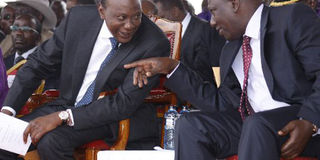Uhuru, Ruto get boost as states seek deal on ICC

President Uhuru Kenyatta shares a word with his deputy William Ruto at a past function. Kenya’s attempts to free the President and his from attending Hague trials gained momentum Monday night after a fresh draft proposing drastic amendments emerged. Photo/FILE
What you need to know:
- The proposal, which appeared to have been drawn up to strengthen an earlier one on the same article by Britain, was sponsored by Guatemala and Greece. The two countries opposed the deferral of the Kenyan cases at the UN Security Council meeting in New York.
- Kenya is, however, still keen on the amendment and now plans to push for it at the next Assembly of State Parties meeting in February.
Kenya’s attempts to free President Uhuru Kenyatta and his deputy William Ruto from attending Hague trials gained momentum Monday evening after a fresh draft proposing drastic amendments emerged.
The new proposal, if adopted, will make it easier for judges to allow those who have exceptional State duties to be tried in their absence.
Coupled with other proposals to have the accused attend court by video link, the changes could significantly reduce the court load on the President and his deputy. But they fall short of the African Union proposal which Kenya supports to grant sitting heads of state immunity from ICC prosecution.
The new proposal targeted article 134 on Rules of Procedure and Evidence of the ICC and may be adopted by the Assembly of State Parties Wednesday.
The proposal, which appeared to have been drawn up to strengthen an earlier one on the same article by Britain, was sponsored by Guatemala and Greece. The two countries opposed the deferral of the Kenyan cases at the UN Security Council meeting in New York.
Attorney-General Githu Muigai, who is leading the Kenyan delegation at the Assembly, welcomed the new development describing it as a major achievement in Kenya’s mission at the conference.
“We are making headway on the key issues of interest to Kenya. There is a consensus that some of the rules of procedure must change because they are not practical at the moment,” he said. “The formal meetings and negotiations have only just started and we envisage a result in two or three days.”
On Friday, Kenya’s request for the amendment of article 27 of the Rome Statutes appeared to have hit a brick wall after it was rejected, leaving the proposed amendment of Rules of Procedure and Evidence of the ICC as the only alternative.
Kenya is, however, still keen on the amendment and now plans to push for it at the next Assembly of State Parties meeting in February.
The proposals were, however, opposed by NGOs at the talks.
The proposed amendment allows the accused to be away from trial and to be represented by counsel only during part or parts of his or her trial.
“The Trial Chamber shall rule on the request on a case-by-case basis, with due regard to the subject matter of the specific hearings in question,” said part of the proposed amendment.
The new rule, if passed as proposed, will require judges to acknowledge the existence of exceptional circumstances in deciding whether to grant an individual a request for excusal from presence at trial.
“In determining the existence of exceptional circumstances under sub-rule 2(a), the Trial Chamber shall consider that such circumstances exist if it is satisfied that the accused is mandated to fulfil highest responsibilities for a State and that important and extraordinary public duties require his or her physical presence,” reads part of the proposed amendment.
Britain had suggested another amendment to guarantee use of technology, making it easier for Mr Kenyatta and Mr Ruto to attend court via video conferencing.




